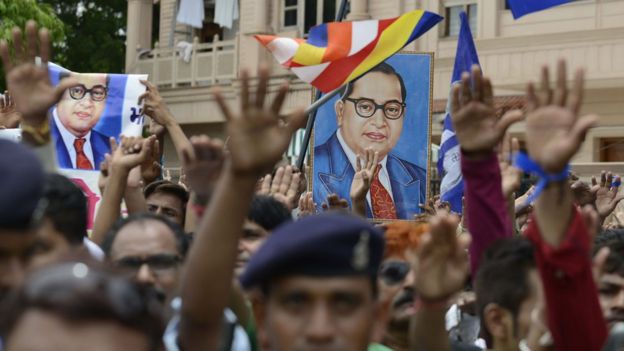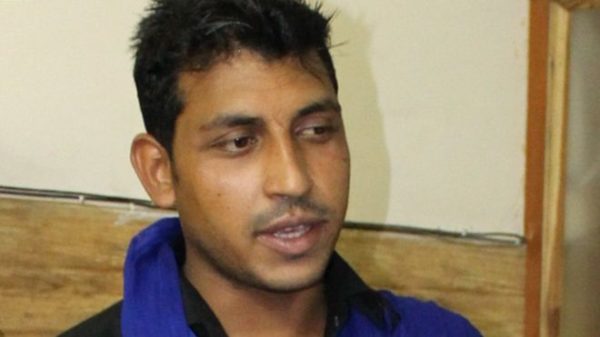Thousands of Dalits (formerly untouchables) converged in the Indian capital, Delhi, at the weekend to protest against recent caste riots in the northern town of Saharanpur. They were led by the Bhim Army – the BBC’s Geeta Pandey profiles its young, charismatic leader, Chandrashekhar.
On Sunday afternoon, Delhi’s Jantar Mantar observatory, a popular venue for all sorts of protests, turned into a sea of blue when demonstrators wearing blue cloth caps defied police orders and filled every inch of the 18th Century monument ground.
As Mr Chandrashekhar, a 30-year-old lawyer, took the stage, the crowds began chanting “Jai Bhim [Long live Bhim]” – a reference to Indian independence hero and Dalit icon Bhimrao Ambedkar.
Sporting an ink blue scarf, he told his supporters that the “stage is set for struggle” against caste oppression.
The Dalit leader had emerged from hiding to address his supporters – he’s been a wanted man since 9 May when community members clashed with police in Saharanpur in Uttar Pradesh state.
Until his appearance at Jantar Mantar, the only communication from him since then had been an audio message asking supporters to join him at the rally.
On stage, he spoke of a “protracted struggle” against India’s governing Bharatiya Janata Party, which is also in power in Uttar Pradesh. “We will fight to the last drop,” he said. “Not only the [PM Narendra] Modi government, no government will be able to stop us.”
He also announced plans to surrender to the police: “I am not a coward. I wanted to reach you, that is why I remained silent. Now I will surrender to police.”
More than 48 hours later, he is yet to do that.
India’s 200 million Dalits have traditionally been at the bottom of the Hindu caste system and for centuries, they were kept in subjugation by the higher castes. Despite laws to protect them, discrimination remains a daily reality for many of them.
Mr Chandrashekhar’s emergence as a community leader over the past two years is being seen as a new phase in Dalit politics in Uttar Pradesh.
In 2015, he formed the Bhim Army to fight caste oppression in a local college where “Dalit boys were often beaten up for drinking water, not cleaning benches and even sometimes for simply studying hard”.
Last year, he grabbed attention when he was photographed standing next to a signboard outside a village that read “The Great Chamar”. Chamar is a pejorative caste term, used to describe Dalits who work with animal hide.
“But the signboard turns an abuse into an honour. He is attempting to reclaim the caste name, saying there’s no shame in being Chamar, instead it’s great to be one,” Dalit activist Chandrabhan Prasad told the BBC.
“He’s constantly unsettling and challenging the traditional caste hierarchies. He’s often seen sporting other symbols of power, like a pointed upturned moustache and riding a Royal Enfield motorbike.”
This display of chutzpah has made him hugely popular with the young, educated, aspirational members of his community.
Son of a government schoolteacher, Mr Chandrashekhar was born in Chhutmalpur, a village not far from Saharanpur.
But he grew up in Dehradun town (in the neighbouring state of Uttarakhand) where his father worked as a government schoolteacher and Mr Chandrashekhar talks about the discrimination his father endured.
“My father was a headmaster, but he was frequently humiliated in meetings. In the staff room, his glass of water was kept separate from the other teachers,” he told the Quint last year.
“He told me of hundreds of such instances that he didn’t share earlier because he didn’t want us to think that we were less than anyone.”
When his father died from cancer, he returned to his childhood home, where he set up the Bhim Army in 2015.

Recent incidents of discrimination and violence against Dalits have also helped shape his politics – he’s talked about the suicide of Rohit Vemula, a PhD scholar who killed himself alleging persecution by the authorities of Hyderabad university, and the flogging of Dalit men in Gujarat last year.
He has vowed to work to prevent such incidents happening in Uttar Pradesh.
Mr Chandrashekhar is among a new generation of assertive Dalit leaders, along with Jignesh Mevani in the western state of Gujarat, who are refusing to accept the traditional roles assigned to them by their caste identities.
Analysts say he has the potential to change Dalit politics in India’s most populous state – especially as it coincides with the declining influence of Ms Mayawati, the four-time Dalit chief minister.



Leave a reply